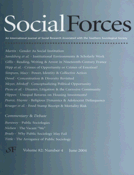-
Views
-
Cite
Cite
Joachim J. Savelsberg, Lara L. Cleveland, Ryan D. King, Institutional Environments and Scholarly Work: American Criminology, 1951–1993, Social Forces, Volume 82, Issue 4, June 2004, Pages 1275–1302, https://doi.org/10.1353/sof.2004.0093
Close - Share Icon Share
Abstract
Neoinstitutional theses are examined for the constitution of criminological knowledge during the transformation of penal regimes and the accompanying emergence of a specialized field of criminology. Effects of this reorganization, historical period, and research funding on scholarly journal publications are examined. Results are based on a content analysis of 1,612 articles published in leading journals between 1951 and 1993. Multivariate analyses support neoinstitutional ideas, as topical and theoretical foci are associated with themes suggested by the policy sector. The replication of the policy sector in academic organization tightens this association. Further, articles based on political funding are more likely to engage new preoccupations of the political sector. Theoretical conclusions drawn in the articles under study, however, are independent of institutional factors.



